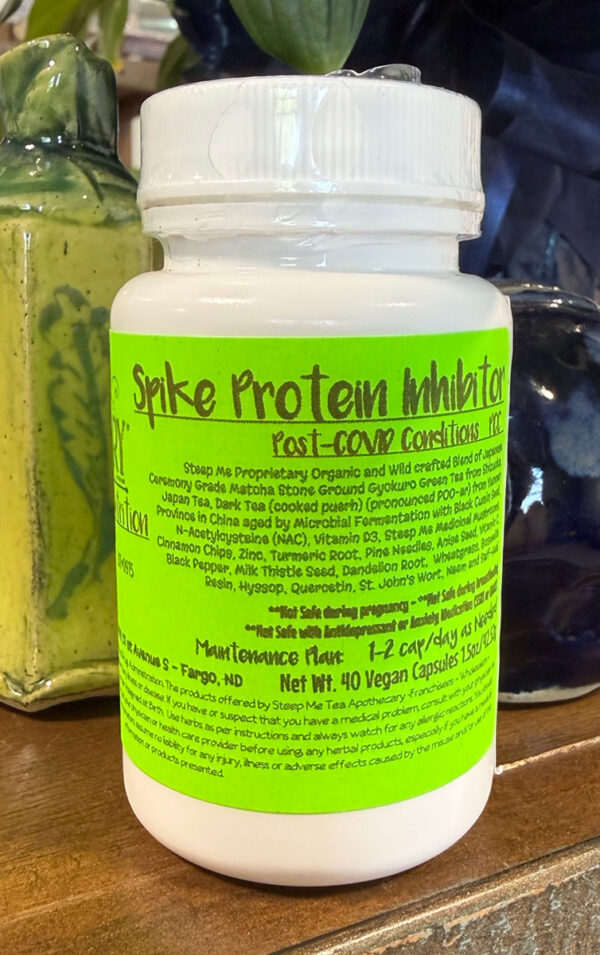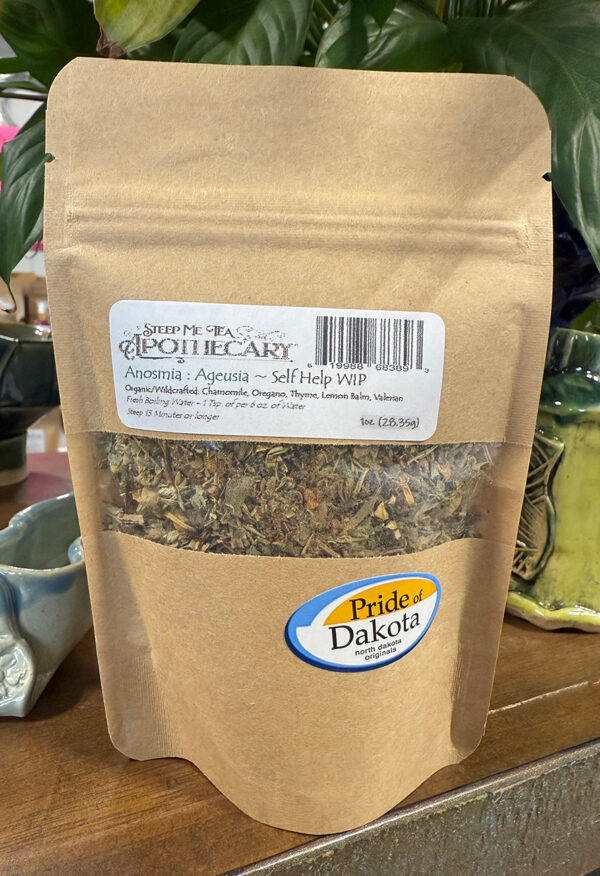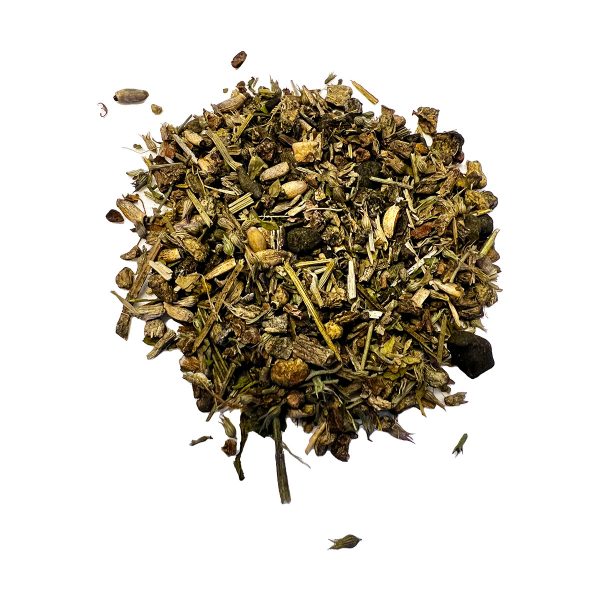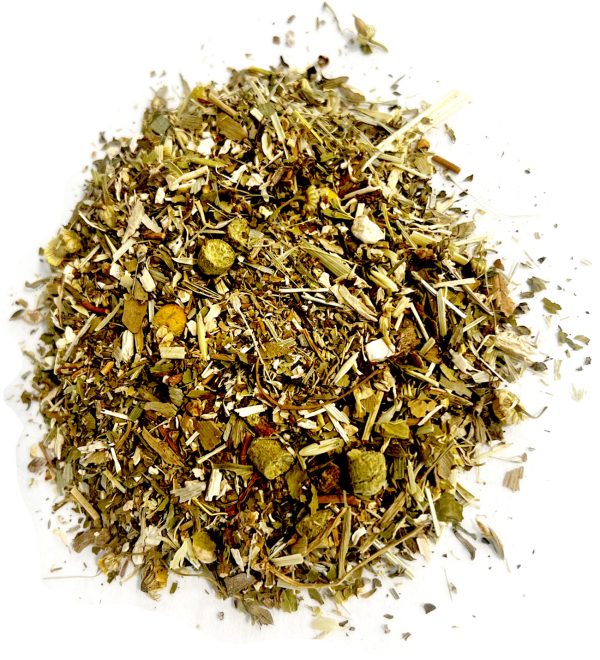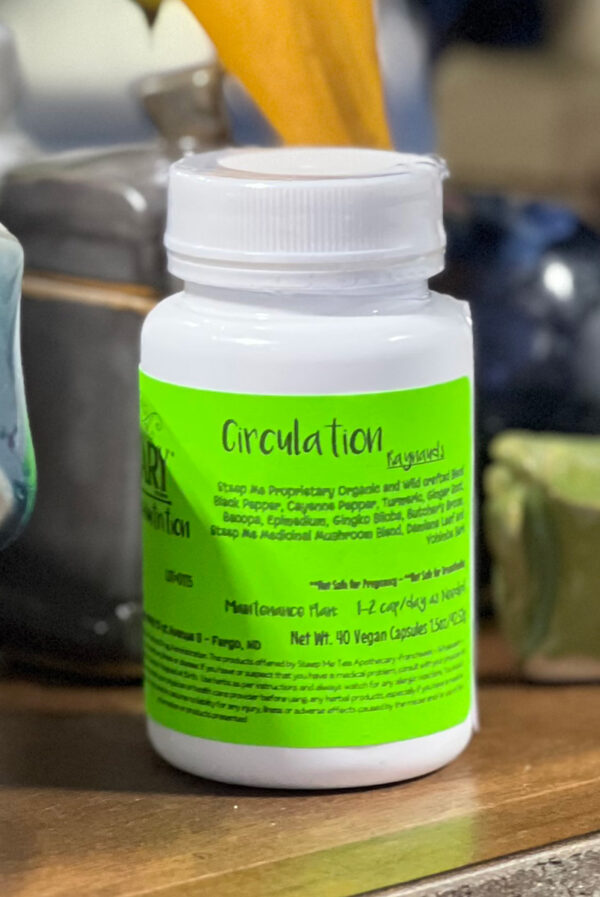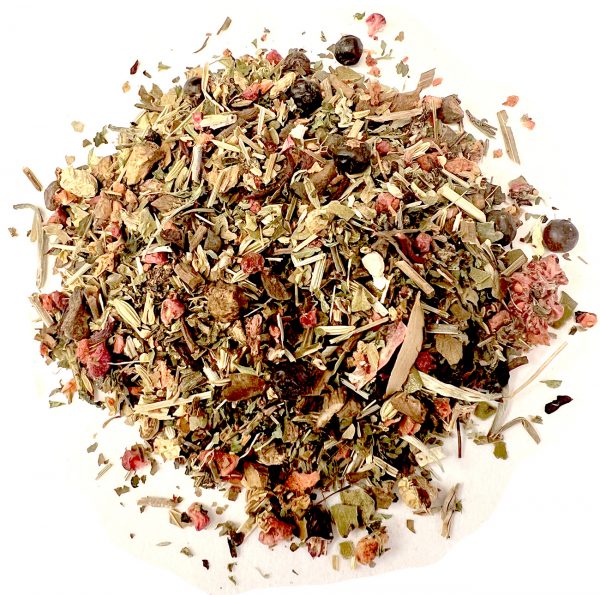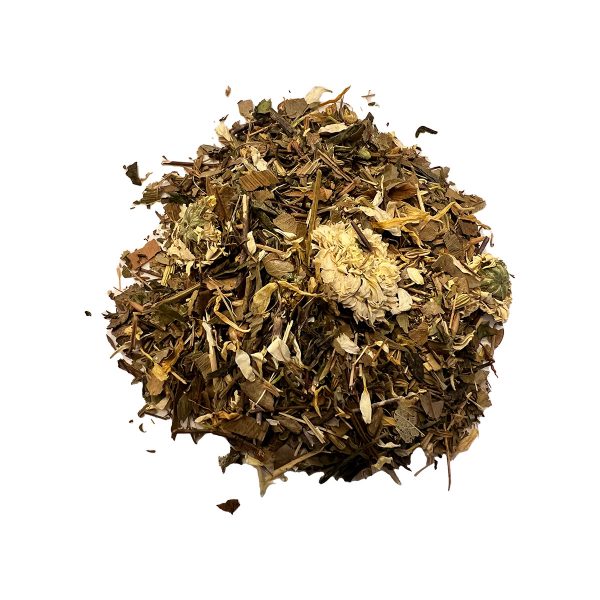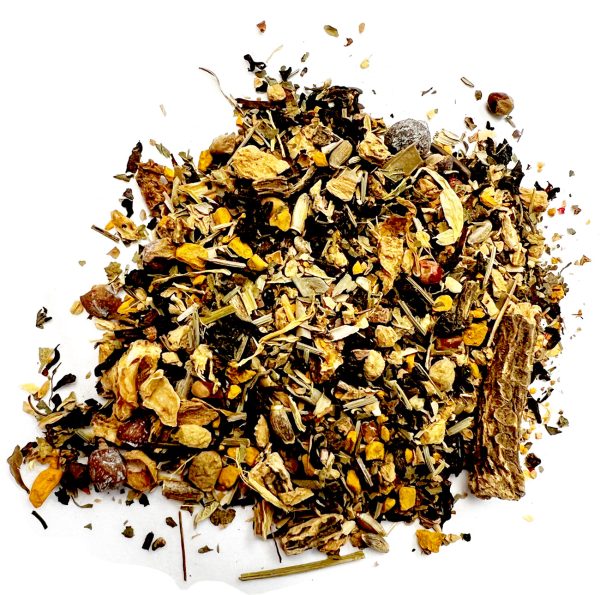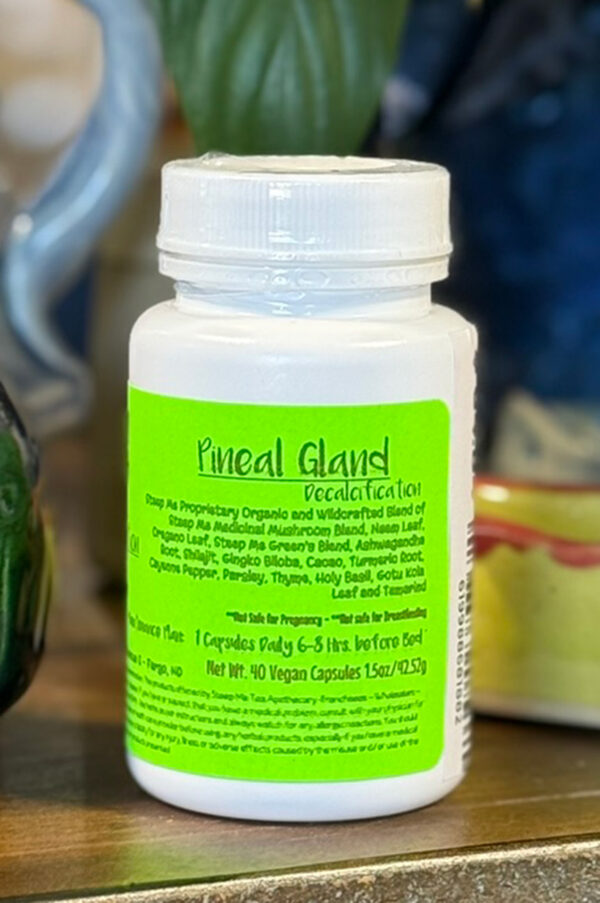With over 400 different kinds of loose tea that will exceed all tea lover’s expectations. You’re sure to find something you will love! All handcrafted by us in North Dakota.
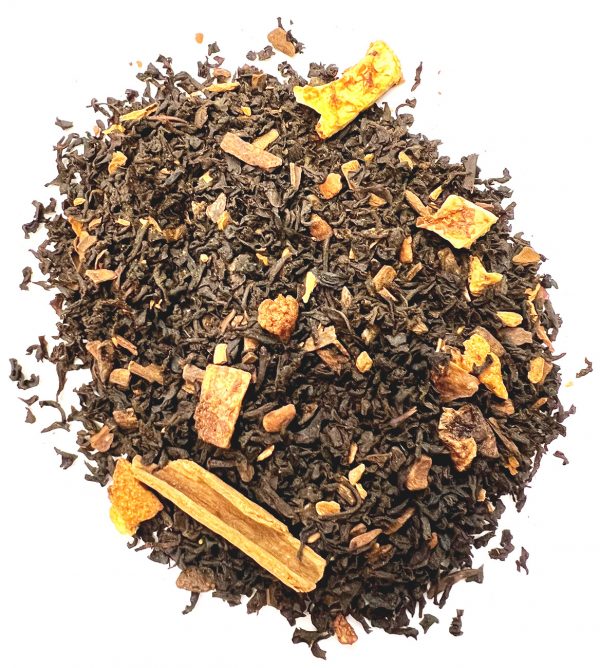
CinnaTottie
From: $13.00
ADHD ~ Autism
From: $70.95
This blend was built to help children to adults with the symptoms of ADHD and Autism. We broke this blend down into two separate capsules.
Description
Blender’s Notes ADHD ~ Autism:
Steep Me Self Help combinations are a great way to get health benefits outside of the standard tea leaf. This blend was built to help children to adults with the symptoms of ADHD and Autism. Attention-deficit/hyperactivity disorder (ADHD) is one of the most common mental disorders affecting children. Symptoms of ADHD include inattention (not being able to keep focus), hyperactivity (excess movement that is not fitting to the setting) and impulsivity (hasty acts that occur in the moment without thought). ADHD is considered a chronic and debilitating disorder and is known to impact the individual in many aspects of their life including academic and professional achievements, interpersonal relationships, and daily functioning (Harpin, 2005). ADHD can lead to poor self-esteem and social function in children when not appropriately treated (Harpin et al., 2016). Adults with ADHD may experience poor self-worth, sensitivity towards criticism, and increased self-criticism possibly stemming from higher levels of criticism throughout life (Beaton, et al., 2022). Of note, ADHD presentation and assessment in adults differs; this page focuses on children. An estimated 8.4% of children and 2.5% of adults have ADHD (Danielson, 2018; Simon, et al., 2009). ADHD is often first identified in school-aged children when it leads to disruption in the classroom or problems with schoolwork. It is more commonly diagnosed among boys than girls given differences in how the symptoms present. However, this does not mean that boys are more likely to have ADHD. Boys tend to present with hyperactivity and other externalizing symptoms whereas girls tend to have inactivity. Many children may have difficulties sitting still, waiting their turn, paying attention, being fidgety, and acting impulsively. However, children who meet diagnostic criteria for ADHD, differ in that their symptoms of hyperactivity, impulsivity, organization, and/or inattention are noticeably greater than expected for their age or developmental level. These symptoms lead to significant suffering and cause problems at home, at school or work, and in relationships. The observed symptoms are not the result of an individual being defiant or not being able to understand tasks or instructions. There are three main types of ADHD: Predominantly inattentive presentation. Predominantly hyperactive/impulsive presentation. Combined presentation. A diagnosis is based on the presence of persistent symptoms that have occurred over a period of time and are noticeable over the past six months. While ADHD can be diagnosed at any age, this disorder begins in childhood. When considering the diagnosis, the symptoms must be present before the individual is 12 years old and must have caused difficulties in more than one setting. Psychiatry.org – What is ADHD?
Autism spectrum disorder is a condition related to brain development that impacts how a person perceives and socializes with others, causing problems in social interaction and communication. The disorder also includes limited and repetitive patterns of behavior. The term “spectrum” in autism spectrum disorder refers to the wide range of symptoms and severity. Autism spectrum disorder includes conditions that were previously considered separate — autism, Asperger’s syndrome, childhood disintegrative disorder and an unspecified form of pervasive developmental disorder. Some people still use the term “Asperger’s syndrome,” which is generally thought to be at the mild end of autism spectrum disorder. Autism spectrum disorder begins in early childhood and eventually causes problems functioning in society — socially, in school and at work, for example. Often children show symptoms of autism within the first year. A small number of children appear to develop normally in the first year, and then go through a period of regression between 18 and 24 months of age when they develop autism symptoms. Some children show signs of autism spectrum disorder in early infancy, such as reduced eye contact, lack of response to their name or indifference to caregivers. Other children may develop normally for the first few months or years of life, but then suddenly become withdrawn or aggressive or lose language skills they’ve already acquired. Signs usually are seen by age 2 years. Each child with autism spectrum disorder is likely to have a unique pattern of behavior and level of severity — from low functioning to high functioning. Some children with autism spectrum disorder have difficulty learning, and some have signs of lower than normal intelligence. Other children with the disorder have normal to high intelligence — they learn quickly, yet have trouble communicating and applying what they know in everyday life and adjusting to social situations. Because of the unique mixture of symptoms in each child, severity can sometimes be difficult to determine. It’s generally based on the level of impairments and how they impact the ability to function. Autism spectrum disorder – Symptoms and causes – Mayo Clinic
We broke this blend down into two separate capsules that can be used in conjunction or can be purchased separately to help customized the results you are looking for.
We created a blend that should be used in the morning to help with grogginess and help start the process of focusing and concentration. We included Red Ginseng which is an herbal remedy used for centuries in China, has a reputation for stimulating brain function and increasing energy plus it has shown some potential to help calm symptoms of ADHD. We added Gingko Biloba Leaf because it has been recommended for improving memory and increasing mental sharpness and focus by increasing blood flow to the brain. We also added Bacopa because it has been used for centuries to improve brain function and memory. Plus, many studies show it can significantly reduce ADHD symptoms, such as restlessness, poor self-control, inattention, and impulsivity. Rhodiola has been shown to reduce mental fatigue, boost brain function and mood, and it can be especially helpful for people who experience burnout. Valerian also helps with sleep problems and lessens the “rebound effect” that some kids experience when stimulants wear off. Guarana Powder may help boost attention, alertness, and memory performance may help reduce perceived exertion and improve athletic and cognitive performance. We added Borage because it can possess sedative properties, and it can have a soothing effect on the nervous system. This can improve focus and concentration, and lower levels of stress hormones in the body, which can lower your oxidative stress. And finally, we added our Steep Me Medicinal Mushroom Blend to help with mental functions and brain health. Finally, we added Ashwagandha. Ashwagandha, an ancient medicinal herb used in Ayurvedic medicine, has been gaining attention for its potential benefits in managing ADHD (attention deficit hyperactivity disorder). Ashwagandha is believed to increase levels of dopamine and norepinephrine, neurotransmitters that play a role in attention and focus. As an adaptogen, Ashwagandha helps the body manage stress, which can be beneficial for individuals with ADHD who often experience higher levels of anxiety. It can improve cognitive function and reaction time in children with ADHD and help obtain better sleep which can positively impact ADHD symptoms, and Ashwagandha is known to help improve sleep quality.
We created a blend that will be used in the evening to help calm and relax the mind and body. We used Egyptian Chamomile because it may help with easing anxiety and promoting sleep. It is also reported to reduce inflammation and promote healing. We added Gingko Biloba Leaf because it has been recommended for improving memory and increasing mental sharpness and focus by increasing blood flow to the brain. Gotu Kola It is high in nutrients that are needed for healthy brain function. These include vitamins B1, B2, and B6. Gotu kola may benefit those with ADHD. It helps enhance mental clarity and reduce anxiety levels. We also added Bacopa because it has been used for centuries to improve brain function and memory. Plus, many studies show it can significantly reduce ADHD symptoms, such as restlessness, poor self-control, inattention, and impulsivity. We included Red Ginseng which is an herbal remedy used for centuries in China, has a reputation for stimulating brain function and increasing energy plus it has shown some potential to help calm symptoms of ADHD. Rhodiola has been shown to reduce mental fatigue, boost brain function and mood, and it can be especially helpful for people who experience burnout. Valerian also helps with sleep problems and lessens the “rebound effect” that some kids experience when stimulants wear off. We added Borage because it can possess the sedative properties, and it can have a soothing effect on the nervous system. This can improve focus and concentration, and lower levels of stress hormones in the body, which can lower your oxidative stress. We added Lemon Balm as a sleep aid and anxiety reducer. And the calming ability of Passionflower which increases the releases of a specific brain neurotransmitter which stimulates the release of a chemical called GABA known to reduce anxiety and improve mood. It also helps relax the muscles. Passionflower has long been used to promote sleep and is seen as a useful weapon in the battle with insomnia and ADHD sleep patterns.
NOTE: “This/these claim(s) has/have not been evaluated by the Food and Drug Administration. This product is not intended to diagnose, treat, cure or prevent any disease.”
Features ADHD ~ Autism:
- Ready to Go
- Lots of individual flavor based on the ingredients.
- All Wildcrafted Herbs
- All Organic where Wildcrafted is not available.
- Maintenance Plan – 1-2 Morning Capsules as Needed Upon Waking
- Maintenance Plan – 1-2 Evening Capsules as Needed 1/2 Hour before Bed
- Caffeine: None
Ingredients Morning: Steep Me Proprietary Organic and Wild crafted blend of Red Ginseng Root, Gingko Leaf, Bacopa, Rhodiola Root, Valerian Root, Guarana Seed, Steep Me Medicinal Mushroom Blend and Ashwagandha Root
Ingredients Evening: Steep Me Proprietary Organic and Wild crafted blend of Egyptian Chamomile Flowers, Gingko Biloba Leaf, Gotu Kola Leaf, Bacopa, Red Ginseng Root, Valerian Root, Borage, Lemon Balm and Passionflower.
Alternatively, try our Anxiety Phyto~Nutrition Capsules OR Anxiety Phyto~Nutrition Tea OR Anxious Brain Phyto~Nutrition Capsule OR Anxious Brain Phyto~Nutrition Tea OR Chillax-D Level 3 Phyto~Nutrition Tea
Not Safe for Pregnancy
Not Safe for Breastfeeding
Limited Use with Antidepressant or Anxiety Medication (SSRI or MAOI)
NOTE: This/these claim(s) has/have not been evaluated by the Food and Drug Administration. The products offered by Steep Me Tea Apothecary -Franchisees – Wholesalers – Influencers or SteepMe.com are not intended to treat, cure, or prevent any illness or disease. If you have or suspect that you have a medical problem, consult with your physician for diagnosis or treatment. All gender specific blends are based on Gender Assigned at Birth. Use herbs as per instructions and always watch for any allergic reactions. You should always carefully read all product packaging and labels. Always consult your physician or health care provider before using any herbal products, especially if you have a medical problem. Steep Me Tea Apothecary and SteepMe.com and/or its proprietors assume no liability for any injury, illness or adverse effects caused by the misuse and/or use of the information or products presented.
NOTE: When using Teas, Capsules, Tinctures and Micro-Nutrition to help with your ailment ~ please remember this is a marathon ~ we recommend an investment of time of at least 6 months to see positive change. Any gender specific blends are based on gender assigned at birth.
Great article on natural supplements for ADHD and Autism. 7 Best Herbs for Treating ADHD (healthline.com)
Additional information
| Weight | 8 oz |
|---|---|
| Size | , , |
Benefits
When talking about the many types of tea, Tisane (Herbal Infusion) or Herbal Tea or Self-Help Tea is really not tea at all. It is made like a tea and all the same items are used to make it, but it does not contain the Camellia Sinensis Plant (unless stated), but is simply roots, flowers, leaves, and fruits put together is a combination that is made just like a tea. With that being said…the health benefits of a Tisane or Herbal teas are different. They can vary depending on the ingredients and combination of herbs so there are no blanket health benefits – just depends on the ingredients. For many, the best part of Tisane or Herbal Tea or Self-Help Tea is the fact that it is caffeine free naturally. Of course there are herbs that can be added to change that. The most popular Herbal teas include Chamomile, Peppermint, Spearmint, and any combination of fruit blends or infusions. Our Self-Help Teas are simply supplemental herbal combinations to aid with an occasional ailment specific to what may be happening in your life. The teas are built to work and are not build with any specific flavorings. The blends are tested to the minimum requirements laid out by Steep Me A Cup of Tea. The taste provided is natural to the herbs present in the blend. No flavorings added. This/these claim(s) has/have not been evaluated by the Food and Drug Administration. The products offered by Steep Me Tea Apothecary -Franchisees – Wholesalers – Influencers or SteepMe.com are not intended to treat, cure, or prevent any illness or disease. If you have or suspect that you have a medical problem, consult with your physician for diagnosis or treatment. Use herbs as per instructions and always watch for any allergic reactions. You should always carefully read all product packaging and labels. Always consult your physician or health care provider before using any herbal products, especially if you have a medical problem. Steep Me Tea Apothecary and SteepMe.com and/or its proprietors assume no liability for any injury, illness or adverse effects caused by the misuse and/or use of the information or products presented.
Tisane or Herbal Tea or Self-Help Tea
Related products
Ageusia (Taste) ~ Anosmia (Smell) Repair – WIP
From: $16.00
This blend was built to help build back your taste and smell. Studies show many people can lose their senses of taste or smell, likely because the virus damages their olfactory nerve and cells that support it. The combination of herbs will focus on your central nervous system Anosmia and Ageusia Technically!
Select options
This product has multiple variants. The options may be chosen on the product page
Alcohol – Drug Detox
From: $18.00
The blend was built to help the body detox Alcohol and Drug use and the symptoms that can occur thru detox.
Select options
This product has multiple variants. The options may be chosen on the product page
Anxious Brain ~~ GRAS Certified Ingredients
From: $18.00
Blender’s Notes Anxious Brain ~~ GRAS Certified Ingredients: Steep Me Self-Help combinations are a wonderful way to get health benefits
Select options
This product has multiple variants. The options may be chosen on the product page
Circulation ~ Raynaud’s
From: $70.95
Select options
This product has multiple variants. The options may be chosen on the product page
Edema
From: $20.00
The blend was built specifically to help built to help with increased and trapped swelling of the body – especially hands, feet, calves, and ankles.
Select options
This product has multiple variants. The options may be chosen on the product page
Eye Health – WIP
From: $16.00
The blend was built to help maintain and improve eye health including glaucoma, cataracts and pressure balancing.
Select options
This product has multiple variants. The options may be chosen on the product page
Pancreatic
From: $15.00
The blend was built specifically to help the Pancreases to detox, deliver hormones and ease the symptoms of inflammation or Pancreatitis. Your pancreas, a small organ rarely thought of until it causes problems, is vital for your digestive system as well as the endocrine process.
Select options
This product has multiple variants. The options may be chosen on the product page
Pineal Gland Decalcification
$58.95


